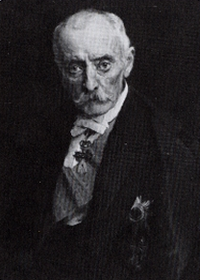Prince Chlodwig Karl Victor zu Hohenlohe-Schillingsfürst, von Ratibor und Corvey a politician and diplomat, one of the founders of the German Empire , Prince of Corvey and Ratibor .
| Chlodwig zu Schillingsfürst-Hohenlohe | |||||||||
|---|---|---|---|---|---|---|---|---|---|
 | |||||||||
| |||||||||
| Monarch | Wilhelm II | ||||||||
| Predecessor | Leo von Caprivi | ||||||||
| Successor | Bernhard von Bülow | ||||||||
| |||||||||
| Predecessor | Boto zu Eilenburg | ||||||||
| Successor | Bernhard von Bülow | ||||||||
| Birth | |||||||||
| Death | |||||||||
| Rod | |||||||||
| Birth name | |||||||||
| Father | |||||||||
| Children | |||||||||
| The consignment | |||||||||
| Religion | Catholicism | ||||||||
| Autograph | |||||||||
| Awards | |||||||||
Biography
The representative of the princely house Hohenlohe . He is married to Princess M. L. Wittgenstein , the granddaughter of a Russian field marshal and heir to the Radziwill state . A relative of the wife of William II [5] . The younger brother is Cardinal Gustav Adolf von Hohenlohe-Schillingsfürst .
Public Service in Bavaria
In 1846 he took the place in the Bavarian Reichsrat. Prime Minister , Minister of Foreign Affairs and Minister of the Royal Court of Bavaria in 1866-1870. He was a supporter of the political unification of Germany in a single state. After the creation of the German Empire, he switched to the civil service of united Germany.
Public service in the German Empire
Hohenlohe served as First Vice President of the Reichstag .
Ambassador of Germany to France in 1874-1885. By taking this post, Hohenlohe discovered that his predecessor, Harry Karl Kurt Edward von Arnim, seized a number of important state documents concerning the future abolition of the papal throne and conclave, about which, on June 8, 1874, was reported to Berlin. This triggered a lengthy litigation, which was terminated only after the death of Harry von Arnime [6] . From April to August 1880, Secretary of State for the Imperial Office of Foreign Affairs.
Viceroy of Alsace-Lorraine in 1885-1894.
Chancellor of Germany in the years 1894-1900. Since 1898, the power actually passed into the hands of State Secretary for Foreign Affairs B. von Bülow , who replaced Hohenlohe as Chancellor in 1900.
Literature
- Volker Stalmann: Fürst Chlodwig zu Hohenlohe-Schillingsfürst 1819-1901. Ein deutscher Reichskanzler . Schöningh, Paderborn 2009, ISBN 978-3-506-70118-3 .
- Winfried Baumgart: Chlodwig zu Hohenlohe-Schillingsfürst. In: Wilhelm v. Sternburg (Hrsg.): Die deutschen Kanzler. Von Bismarck bis Kohl. 2nd edition, Berlin 1998, pp. 55-67.
- Heinz Gollwitzer: Die Standesherren. 2nd Edition, Vandenhoeck & Ruprecht, Göttingen 1964.
- Olav Zachau: Die Kanzlerschaft des Fürsten Hohenlohe 1894-1900. Politik unter dem "Stempel der Beruhigung" im Zeitalter der Nervosität. Hamburg 2007. (Studien zur Geschichtsforschung der Neuzeit, Volume 48) ISBN 978-3-8300-2694-5 .
Notes
- ↑ 1 2 SNAC - 2010.
- ↑ 1 2 Encyclopædia Britannica
- ↑ 1 2 The Peerage
- ↑ German National Library , Berlin State Library , Bavarian State Library , etc. Record # 118706314 // General Regulatory Control (GND) - 2012—2016.
- ↑ "The Uncle of the Empress" Clovis de Hohenlohe-Schillingsfürst // A. Patrushev. German Chancellors from Bismarck to Merkel. - M .: Publishing House of Moscow University, 2009.
- ↑ Arnim Harry-Karl-Kurt-Eduard // Encyclopedic Dictionary of Brockhaus and Efron : in 86 tons (82 tons and 4 extra). - SPb. , 1890-1907.